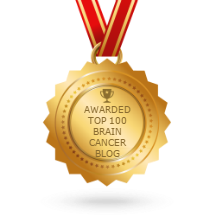MRI Scan
MRI scan was carried out on a Sunday - yes a Sunday. Its good to see the NHS making full use of expensive resources. Today we got the results of the scan and it was more good news. The scan showed that the active part of the tumour (the grade IV part) was still stable and was slightly smaller in size than 2 months ago. This is now 6 months without any significant progression of the disease. The low grade part of the tumour was also slightly smaller than at the last scan. Dr Sanghera was pleased with the progress and following Deb's good blood test results prescribed another month of continuous chemotherapy.
Results of Multi Disciplinary Team Meeting
At the last appointment with Dr Sanghera we had again discussed whether surgery was appropriate and this option had been discussed at an MDT meeting. Mr Kay, the neurosurgeon, said he could remove the active part of the tumour (or at least the active bit we can see on the scan).The opinion of the team was that surgery would not improve Deb's prognosis but may have some benefits in reducing the mass effect from the tumour and oedema (fluid around the tumour) There are risks from surgery and the balance of opinion thought that while Deb was responding well to the temozolomide treatment surgery was not the best option. However Deb and I are to have a meeting with Mr Kay to discuss the issue.
Steroids
Following the last appointment with Dr Sanghera, Deb dropped her steroid dose from 3 mg per day to 2 mg. After 10 days to 2 weeks she found she was suffering from increasing dizziness and after discussion with the clinical nurse specialist went back up to 3 mg. This seems to be about the right level for her. I asked if oedema could be seen on the scan (the tumour creates lots of fluid in the brain) and if so could we use the scan to monitor the effectiveness of the steroid dose. Dr Sanghera showed us another view of the scan which clearly showed the oedema around the mass of the tumour but Deb's symptoms are a more reliable way of deciding what dose of steroids is appropriate.
Drug trials
Following discussion of drug trials at the Conference we raised this with Dr Sanghera. The only trial currently ongoing that could have been relevant is the 'Regal' study (which is using a new drug cediramib with lomustine) but this is used when a tumour has returned after initial treatment and not appropriate for Deb.
Chemotherapy
I asked how long Deb could continue on the chemotherapy? Dr Sanghera said Deb was tolerating the drug well and we would continue with the continuous dose until it was obvious it was no longer effective. In the long term (12 - 18 months) chemotherapy can have adverse effects on the bone marrow and we may have to stop the treatment if this becomes a factor.
Everything continues as before. Next appointment we may see a Dr Sheriff as Dr Sanghera is away. Next MRI scan is due in 2 months but a longer period (3 months) between scans may be considered if tumour continues to remain stable.

